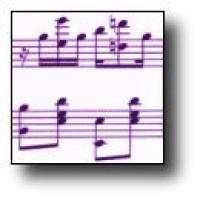
Music to their ears

[Image DHD Photo Gallery]
The connection between mathematics and music has always found fertile ground in the work of Mozart. Many scholars have analysed the mathematical nature of his music, for example investigating if he used formulae like the golden ratio to decide how to section his movements. It has even been suggested that there is a "Mozart effect" - that listening to pieces by this composer can help students concentrate or even improve their test scores!
This effect has been a subject of much debate in the scientific community, but regardless of whether the theory can be proved, students at Windhill Primary School in Southern Yorkshire appear to be benefitting from the Mozart treatment.
The school is part of a one-year pilot program to investigate the effect of listening to music on the students' overall educational experience. And it is not just Mozart that is on the play list. Chopin and Brahms are used for assemblies, Beethoven is played for its calming effects and even pop music such as the Mission Impossible theme or a tune from Kylie are suitable for more active
moments.
However it is Mozart that seems to be particularly suitable for accompanying maths lessons. In one experiment, the pupils from a Year 6 class which listened to the composer performed 10% better than those taught without. "We have found that Mozart symphonies which have complicated note patterns stimulate mathematical thinking," the head teacher Doulla Simon said. "The music reaches certain parts of the brain which other composers do not."
So perhaps Mozart is music to a maths student's ears after all!